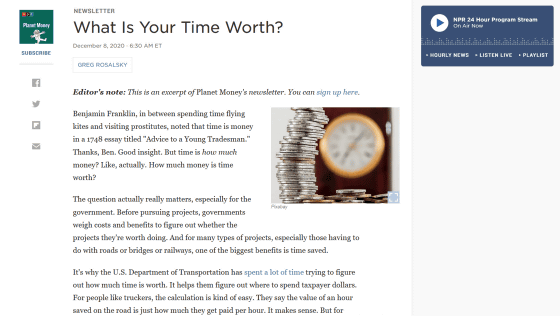What is the result of researchers calculating the 'hourly price' in cooperation with the ride-hailing service Lyft?

It is said that 'time is money', but in reality people spend money on various services to save time and make a trade-off between time and money. In order to measure the value of time that people think, the 'hourly price' calculated by researchers in collaboration with
The Value of Time in the United States: Estimates from Nationwide Natural Field Experiments
https://ideas.repec.org/p/feb/natura/00720.html
What Is Your Time Worth ?: Planet Money: NPR
https://www.npr.org/sections/money/2020/12/08/943812834/what-is-your-time-worth

The value of time is an issue of interest to everyone, but it is a very important topic, especially for the government. Before doing various public works projects, the government weighs the 'necessary costs and benefits' to determine if it is really worth the business.
The biggest merit of the construction of large-scale roads, bridges, railroads, etc. among the projects carried out by the government is 'time reduction', and accurate estimation of the value of time is to know whether public works should be carried out. It is important. As a result, the
Attempts to convert travel time into monetary amounts are difficult due to differences between truck drivers, etc., whose travel time is directly linked to income, and people who travel privately. However, in 1997, the United States Department of Transportation devised a formula for assessing individual travel time based on the best findings available at the time. According to this formula, 'half the amount of money a general household produces in an hour = the value brought about by shortening the travel time by one hour', and at the time of writing the article, '$ 14 per hour (about 1500 yen)' is the time. It is said that it is worth.
However, the results of a survey using fictitious assumptions such as 'How much can I pay to save 5 minutes?' May not directly reflect real-world judgments. Therefore, academic researchers and Lyft's joint research team conducted a large-scale social experiment using Lyft's vehicle dispatch service that is actually used in reality.

Before the pandemic of the new coronavirus, the research team fine-tuned Lyft's waiting times and prices in nine cities in the United States, including New York, Boston, San Francisco, Los Angeles, Atlanta, Miami, San Diego, Austin, and Seattle. Collected data.
The experiment yielded a total of 14 million pieces of data, including the impact of waiting times and price changes on user decision-making on boarding requests, and how much people are willing to pay to speed up boarding. I got it. This reflects people's 'value of their time' in the real world and is believed to be more accurate than the data obtained from questions about fictitious situations.
Working with a real-life platform like Lyft, which has millions of users, is a dream for economists. In addition, Lyft also wants to fine-tune its pricing strategy to maximize profits, so this experiment was beneficial to both parties.

by
After analyzing the data obtained from the experiment, the research team calculated that 'an hour is worth $ 19 ' for Americans. 'The value of time we estimated was much higher than the value of people's time estimated by the US government,' said Robert Metcalfe of the research team.
In addition, the data also revealed that the value of one hour fluctuates depending on the time of day, and the time that overlaps with the peak of commuting is 50% higher than the value of other hours. It was said that. The research team points out that this result makes sense because people during their commute are reluctant to be late. Also, it seems that the value of one hour has increased even on rainy or snowy days, probably because many people want to shorten the waiting time for cars on bad weather days.
It should be noted that this study was conducted in a large city where residents have sufficient disposable income and do not hesitate to use a taxi, and there are many meetings and meal reservations where a delay of 5 minutes can be a problem. Is required. These factors lead to the result of people overestimating the value of time they think, but the research team adjusted the sample to correct these biases, so the calculated 'value of one hour' Is confident.
'I think today's policy makers underestimate people's time. They don't think time is as important as people think. This is how the government spends money,' said Metcalfe. It's important to think about whether to use it, and the benefits of public works that reduce latency and travel time may not be appreciated correctly. '

Related Posts:
in Note, Posted by log1h_ik







